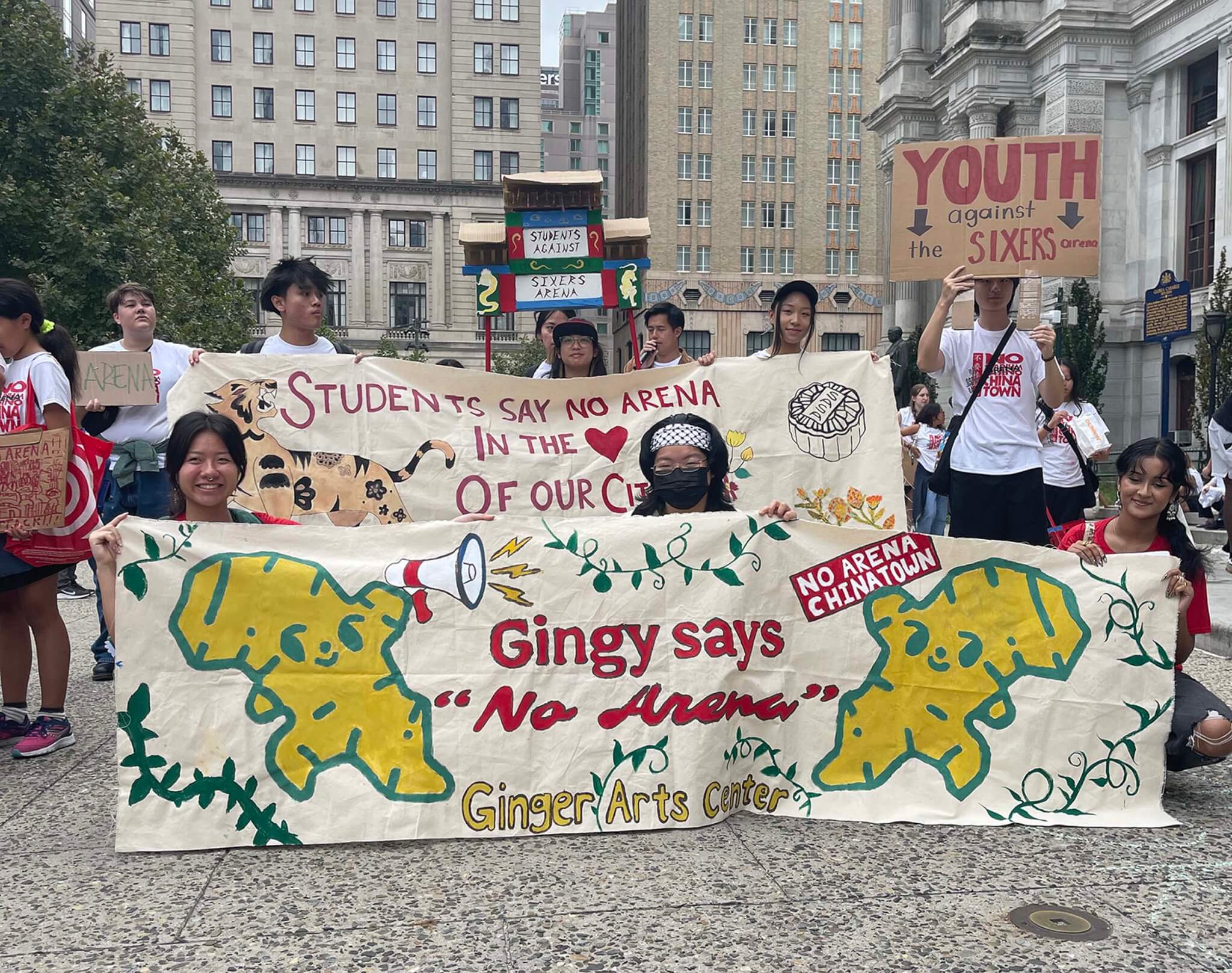The Camden 76ers? Has a nice ring to it, if you’re from New Jersey. In response to massive grassroots protests against plans by Gensler to build 76 Place—a speculative $1.3 billion basketball stadium in Philadelphia’s Chinatown—76 DevCo. is now eying sites in Camden, Cape May, and Atlantic City for its new home.
New Jersey officials recently floated a juicy relocation package for 76 DevCo. to lure the Sixers to the Garden State. In exchange for leaving the City of Brotherly Love, the 76ers would get up to $900 million in economic incentives, and potentially $500 million in bonds according to reporting in ESPN.
It’s unlikely that the 76ers would change its name if they move east of the Delaware River. But a recent poll found 69 percent of Philadelphians oppose the Chinatown arena, and 76 DevCo. has just a few months left to find a new spot for a sports complex before its lease expires at the Wells Fargo Center in December 2024. The historic franchise needs to have a spanking new basketball shed by 2031.
Today, the Sixers’ practice facility is located in Camden. The new stadium would be built atop a 16-acre site near the practice facility on the Camden waterfront where a shuttered state prison once stood. Will the Sixers move to the burbs? Or stay in situ?
Heating Up
Sports franchises moving from dense, inner cities to the periphery is nothing new. In 1976, the New York Giants left the Polo Grounds in upper Manhattan for the Meadowlands in search of more space for parking and lower taxes, much like what the Sixers are being offered today.
Gensler first released design renderings for a new stadium in Philly’s Chinatown in 2023. The complex has since undergone numerous (albeit minor) revisions, and anti-stadium protesters have been extremely creative in their opposition tactics.
Last year, on the heels of an Eagles game, activists rented an airplane with a banner attached to its rear addressed to 76 DevCo. CEO: “JOSH HARRIS. GO AWAY. XOXO. PHILLY CHINATOWN.” More recently, the Save Chinatown Coalition, a local activist group, baked Philadelphia Mayor Cherelle Parker a birthday cake with red icing on it that said: “Mayor Parker: Happy Birthday! Save Chinatown!”

Jenny Chen, a Save Chinatown Coalition member, said in a statement about the cake: “We wanted Mayor Parker to know we’re thinking about her on her birthday, and we’re watching what she does. The future of Chinatown’s immigrant community rests in Mayor Parker’s hands, and we’re asking the mayor to listen to the 69% of Philadelphia voters who oppose this arena. Philadelphia needs Mayor Parker to stand with the people, not billionaire sports team owners.”


An economic study in 2024 found that 76 Place could cost taxpayers up to $1 billion in lost revenue, further aggravating the opposition movement. In response to the protests, Gensler acknowledged it can’t make everybody happy.
“At Gensler, we believe that design is a collaborative process and that design is richer when there are more voices than less at the table,” Gensler co-CEO Jordan Goldstein told AN in 2023, but designers “can’t satisfy all the needs that have been voiced but the project needs to entertain, filter, and vet them throughout the process to ensure the project adds to—not takes away from—the surrounding community.”
Sports Complex vs. Medical Research Labs
Gensler’s tentative basketball arena has sparked existential questions about the detrimental impact stadiums have on their host cities, and gentrification and inequality more broadly. Moreover, healthcare workers at Jefferson Hospital in Center City, not far from where 76 Place would be built, have very real concerns about how game nights would make it harder for ambulances to enter and exit their facility on Chestnut Street.
“My hospital already struggles to get folks into the emergency bay, just being close to Market Street,” said Pari Pancholy, a medical student in Center City, in a statement. “The one-way and narrow streets of Philadelphia were not built for cars, much less ambulances. It’s not just patients who need to reach us quickly, it’s transplanted organs for someone getting a second chance; it’s blood for someone in surgery. Organs and blood do not care about a basketball game. My question for City Council is this: Is sacrificing patients’ health worth it to sit courtside at a shiny new arena?”

As such, elected officials including council member Nic O’Rourke, state representatives Rick Krajewski and Chris Rabb, and state senator (and architecture critic) Nikil Saval have since gone to bat for protesters and joined the anti-stadium opposition movement.
“People who live in Chinatown, who love Chinatown, and who refuse to let their neighbors be forced out don’t want this community sacrificed for the sake of increasing the wealth of a few billionaires who have demonstrated that they only care about our city in terms of how much they can profit from it. Philadelphia does not want an arena in Chinatown, and neither do I,” Saval said in a statement.
In The Philadelphia Inquirer, Inga Saffron reported this month that ulterior development groups are already cooking up different schemes for the Chinatown site amid the public outcries. Comcast Spectator recently unveiled a speculative plan to reuse the Fashion District Mall on Market Street, where 76 Place would be built, into medical research labs instead of a stadium.
On September 11 at the Philadelphia Convention Center, Mayor Parker will hold a public meeting to discuss the stadium.

